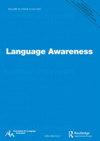Translating intercultural experiences into pedagogic insights: shifts in language teachers’ perceptions of English as a language for intercultural communication
IF 2.2
2区 文学
0 LANGUAGE & LINGUISTICS
引用次数: 3
Abstract
Abstract These days, many pre-service and in-service language English language teachers now complete at least part of their professional training overseas. There is, thus, an important question concerning the impact of intercultural encounters on teachers’ perspectives towards the English language and the teaching of English. This paper reports on a study of how a small group of in-service teachers interpreted their experiences of intercultural communication in the UK whilst completing an MA TESOL degree, illuminating the nature of teachers’ perceptions of language and culture and how teachers translated insights derived from reflection on experience into pedagogic insights for the teaching of English as a global language. The findings reveal that participants’ views shifted away from highly normative conceptions of English language use as they recognised the variability and fluidity of communication in real-life intercultural encounters. Based on critical moments in their communication experiences, teachers articulate the importance of broadening their own learners’ perspectives on diversity within the English language and helping them develop cognitive and attitudinal tools to interact appropriately with diverse others. The paper contributes to understanding of the facilitative potential of teachers’ reflections on their own experiences of linguistic and cultural diversity in coming to formulate pedagogical ideals and concrete methodological possibilities.将跨文化经验转化为教学见解:语言教师对英语作为跨文化交际语言的看法的转变
目前,许多职前和在职英语教师至少在海外完成了部分专业培训。因此,跨文化接触对教师对英语语言和英语教学的看法的影响是一个重要的问题。本文报告了一项研究,研究了一小群在职教师在英国完成硕士TESOL学位时如何解释他们的跨文化交际经历,阐明了教师对语言和文化的看法的本质,以及教师如何将经验反思的见解转化为英语作为一种全球语言的教学见解。研究结果表明,当参与者认识到现实生活中跨文化交流的可变性和流动性时,他们的观点从高度规范的英语使用观念转变了。根据他们交流经验中的关键时刻,教师阐明了拓宽他们自己的学习者对英语语言多样性的看法的重要性,并帮助他们发展认知和态度工具,以适当地与不同的人互动。本文有助于理解教师对自己的语言和文化多样性经验的反思在制定教学理想和具体方法可能性方面的促进潜力。
本文章由计算机程序翻译,如有差异,请以英文原文为准。
求助全文
约1分钟内获得全文
求助全文
来源期刊

Language Awareness
Multiple-
CiteScore
3.70
自引率
10.00%
发文量
18
期刊介绍:
Language Awareness encourages and disseminates work which explores the following: the role of explicit knowledge about language in the process of language learning; the role that such explicit knowledge about language plays in language teaching and how such knowledge can best be mediated by teachers; the role of explicit knowledge about language in language use: e.g. sensitivity to bias in language, manipulative aspects of language, literary use of language. It is also a goal of Language Awareness to encourage the establishment of bridges between the language sciences and other disciplines within or outside educational contexts.
 求助内容:
求助内容: 应助结果提醒方式:
应助结果提醒方式:


